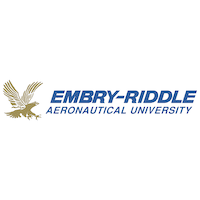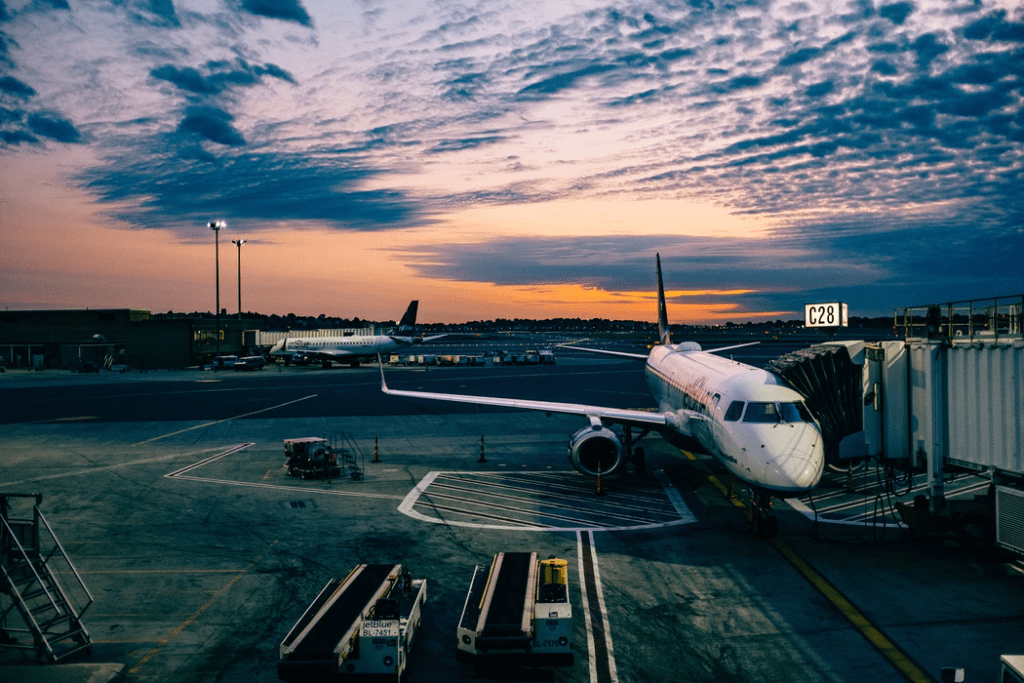An extremely diverse and rewarding industry, aviation employs several types of workers. Whether you want to work as an air traffic controller, professional pilot, or as an operations manager, you can do a lot with a Bachelor’s Degree in Aviation. In this guide, we’ll tell you everything you need to know about getting your Bachelor’s Degree in Aviation.
The US Bureau of Labor Statistics reports that aviation engineers and professional pilots earn a median salary of $118,965. Meanwhile, avionics mechanics and technicians earn a median salary of $64,310. Depending on the career path they choose, aviation students can expect to earn a pretty penny after getting their bachelor’s degree. Though job growth in the industry is currently average, an aviation degree can provide a variety of benefits, which we’ll discuss below.
What Types Of Aviation Degrees Are There?

There are several types of aviation degrees you can earn either through the traditional route or via online programs. Based on your professional goals, you can pursue a degree at the associate, bachelor’s, master’s, or doctoral level.
An associate degree typically consists of 60 credits and spans two years. Applicants only need to submit their high school diploma to be considered. However, this degree will only prepare you for entry-level roles in sectors such as airway transportation and safety inspection.
A bachelor’s degree program is considered the most popular option amongst aviation professionals. Usually comprising 120-130 credits and spanning four years, this route will enable you to pursue several more rewarding careers in aviation. From engineering to management, a bachelor’s degree will qualify you for a high-paying job with several perks.
Moving on, master’s and doctoral degrees may enable you to pursue even higher positions. However, a majority of aviation professionals say they aren’t worth it. For instance, each degree program can take up to five years to complete and may cost up to $50,000. Unless you wish to pursue a career in strategic management or professorship, your time and money would be better spent on a bachelor’s program and flight training instead.
With a Bachelor’s Degree in Aviation, students learn flight technology, aviation law, aviation safety, and many other extensive courses. It is very important to make sure you absorb the necessary skills and knowledge you will need to succeed. The next thing you should do is decide how you want to pursue your degree, offline or online.
Online degree programs have become very popular among learners. Due to the COVID-19 pandemic, this is the only feasible method of learning for a wide number of students. Online learning has a variety of benefits over traditional in-person methods. They are more affordable, convenient, and sometimes, even higher in quality.
Prospective aviation students should consider several factors when choosing an online program. Such factors include school reputation, program specifics, and admission requirements (which vary by institution).
Some programs only admit students with a pilot license, while others let students complete license requirements during their degree. Moreover, aeronautics concentration programs leading to an airline or commercial pilot career must be approved by the Federal Aviation Administration (FAA).
Although general education courses can be taken online, in-person training requirements mean that these types of programs are never 100 percent online. Some programs may require students to already have a pilot’s license or another kind of licensure to enroll. For instance, a flight operations degree program prepares students to work as commercial airline pilots.
On that note, let’s discuss what a typical aviation degree program entails.
Bachelor’s Degree in Aviation Curriculum

Since aviation is a diverse and unique field, a typical curriculum can span several subjects from business to engineering courses. The right program for you should feature a concentration or focus that is aligned with your career goals. We’ve listed some examples of courses you can expect to take during an online aviation degree program:
- History of Aviation and Aerospace
- Aviation Safety Factors
- Aviation Law and Regulations
- Aviation and Climate
- Flight Operations
- Aviation Operations Management
- Avionics Technology
- Aerospace Engineering Dynamics
Furthermore, aviation degree programs offer several kinds of concentrations for students to specialize in according to their professional goals. Concentration areas include aviation safety, flight operations, management, security, and many others.
Ultimately, there is no particular curriculum that aviation students follow. Coursework specifics depend on the professional path that they want to pursue. Aviation management and security degree programs provide a firm understanding of business management, airport security, and marketing. On the other hand, a pilot will pursue a program that focuses on coursework regarding engineering, electronics, and the flying of aircraft.
Whichever path you decide to pursue, it is important to ask yourself what you’re looking for in a program. Are you looking to enter a career in engineering or aviation management? Is the program you’re interested in reputable and accredited? Doing your research on such questions will enable you to find the best possible program, which we’ll discuss next.
Best Bachelor’s Degree in Aviation Programs
Based on factors such as cost, convenience, and reputation, these are some of the best bachelor’s programs we found for you.
Liberty University (Lynchburg, VA)

With its excellent aviation degree program, Liberty University enables its graduates to stand out in the field as top candidates. Liberty University’s School of Aeronautics has won the Loening Trophy for two straight years in a row. This prestigious award recognizes the best all-around college aviation program in the US and carries major prestige in the professional flight community.
Home of Virginia’s largest flight school, Liberty University features highly-accomplished faculty members and mentors. An online Bachelor of Science in Aviation that builds both hard and soft skills, Liberty University’s program covers 120 credit hours of coursework. However, many students may qualify for advanced standing thanks to their flight training and experience. On average, degree-seekers earn their credentials in just 2.5 years.
Coursework focuses on essential aspects of aviation, including safety and security, aircraft maintenance, and navigation. It also explicitly works to build soft skills essential to career success, including leadership, professionalism, communication, and critical thinking. If you’re looking for a convenient, award-winning route to aviation expertise, then this program may be your best bet.
Prerequisites: To qualify for admission, applicants must hold a valid pilot’s license or acquire one through one of the institution’s approved aviation training affiliates.
Everglades University (Boca Raton, FL)

A noted military-friendly school, Everglades University is regionally accredited by the Southern Association of Colleges and Schools Commission on Colleges. Everglades University, located in Boca Raton, Florida, features a great Bachelor of Science in Aviation/Aerospace program.
Degree-seekers can specialize in technical or administrative areas, including aviation safety, aviation security, operations management, and many others. Small class sizes and flexible, asynchronous course delivery methods create convenient learning opportunities for aviation students. With this program, students will broaden their knowledge of the aviation industry, and gain valuable specific skills and knowledge within their respective concentrations.
Online learners can master topics and concepts flexibly, one course at a time. Alternately, local learners can attend traditional classes on campus or combine both face-to-face and online studies to suit their needs.
Prerequisites: Candidates must submit verification of high school graduation or a college degree. Most applicants must take Everglades’ entrance examination or provide SAT or ACT scores. However, Everglades waives this requirement for applicants with a college degree.
LeTourneau University (Longview, TX)

LeTourneau University is accredited by the Southern Association of Colleges and Schools Commission on Colleges. Students in LETU’s versatile Bachelor of Science in Aviation Management program enjoy a broad curriculum. Combining technical training with advanced business education, this option may be right for you.

"Career Karma entered my life when I needed it most and quickly helped me match with a bootcamp. Two months after graduating, I found my dream job that aligned with my values and goals in life!"
Venus, Software Engineer at Rockbot
Learners can specialize in four fields: aircraft dispatch, homeland security, aircraft maintenance, and professional piloting. Every concentration maintains a sharp focus on the human factors that influence safety, operations, and management topics. LETU’s technical programs also hold a prestigious endorsement from the ABET, a STEM-focused specialized accreditor.
Furthermore, students can earn their degree within a year via an asynchronous learning format. Featuring 122 required credits, one-third of the degree path is concentrated on a thorough combination of technical and business courses.
Prerequisites: Prospective students must submit official transcripts from all colleges attended. Transfer students need a minimum 2.0 GPA.
Embry-Riddle Aeronautical University-Worldwide (Daytona Beach, FL)

Utilizing multiple disciplines into its scientific approach, this popular program examines both the human and technical factors that influence aeronautics. ERAU holds the distinction as one of the most prestigious aviation academies in the United States. The regionally accredited Florida-based institution offers degree programs in seven specialized areas, with its Bachelor of Science in Aeronautics being one of its most popular learning paths.
Students in this rigorous 120-credit program engage with various topics that focus on aviation safety and security, aircraft maintenance, air traffic control, and the science of aeronautics. Furthermore, ERAU boasts impressive student achievement rates. In 2015, 97.7 percent of online graduates earned job or continuing education placements within one year of enrollment.
Prerequisites: Applicants must submit official transcripts from all colleges and universities attended. Students with aviation experience can earn prior learning credit for their knowledge and skills.
The University of Nebraska Omaha (Omaha, NE)

This highly-rated aviation program includes courses on the history of aviation and aerospace, aviation safety, and airline operations. A public research institution that dates back to 1908, UNO features a leading collegiate aviation program. Certified by the FAA, this is a particularly great option for anyone who is looking to become a professional pilot
Courses about airport administration, corporate aviation, and general aviation operations offer leadership and management training for aviation students. Online learners can also pursue internship opportunities to build hands-on experience in the field. The Aviation Institute selects students for internships through a competitive process, with opportunities in top industries.
Prerequisites: Applicants must hold a high school diploma or equivalent and submit official transcripts from all previous schools.
Conclusion

Striving for a Bachelor’s Degree in Aviation can be a rewarding endeavour as it leads to challenging, exciting, and high-paying jobs. Whether you’re a certified associate in aviation management or a beginner trying to enter the industry, a bachelor’s program can be very beneficial. With the tools and guidance provided in this article, we here at CareerKarma wish you the very best in your future endeavours.
About us: Career Karma is a platform designed to help job seekers find, research, and connect with job training programs to advance their careers. Learn about the CK publication.



